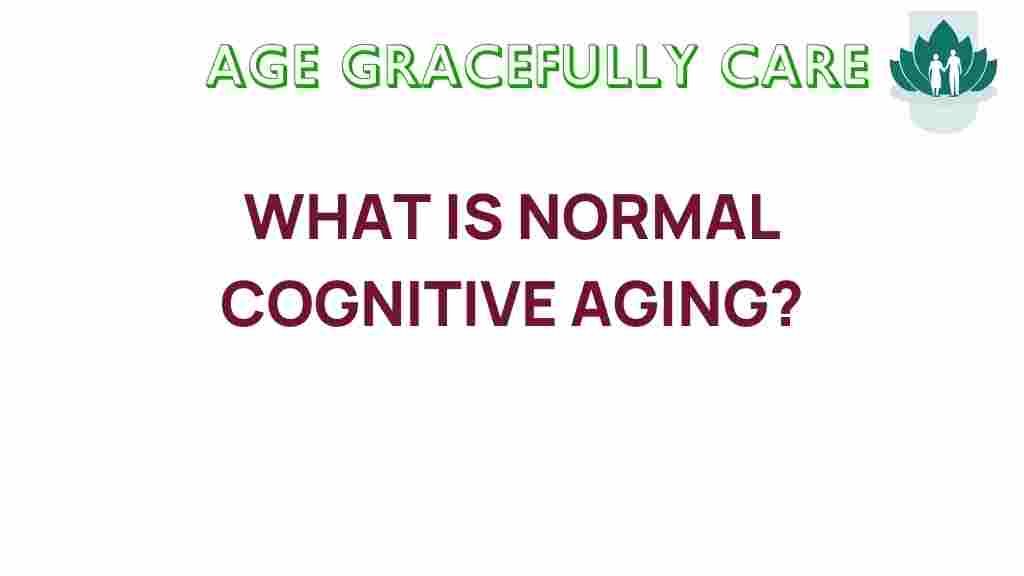Unraveling the Mysteries of Normal Cognitive Aging
The aging process is a natural part of life, and one of its most profound effects is seen in cognitive aging. As we grow older, many of us notice changes in our cognitive function, memory, and overall brain health. Understanding these changes is crucial for promoting healthy aging and maintaining senior wellness. In this article, we will explore the complexities of cognitive aging, the factors contributing to mental decline, and the role of neuroplasticity in maintaining cognitive function.
Understanding Cognitive Aging
Cognitive aging refers to the gradual changes in cognitive function that occur as we age. This encompasses various domains of cognitive performance, including:
- Memory
- Attention
- Language
- Problem-solving skills
- Processing speed
Many people experience some level of cognitive decline as they age, but it’s essential to differentiate between normal aging and pathological conditions like dementia. Normal cognitive aging can include:
- Minor forgetfulness
- Slower processing of information
- Difficulty multitasking
While these changes can be concerning, they are often a normal part of the aging process and do not necessarily indicate a severe cognitive impairment.
The Science Behind Cognitive Aging
As we age, our brains undergo several physiological changes that can affect cognitive function. Some of the key factors include:
- Neurodegeneration: The gradual loss of neurons and neural connections can impact memory and processing speed.
- Reduced neuroplasticity: Neuroplasticity is the brain’s ability to reorganize and form new connections. With age, this capacity may diminish.
- Changes in brain structure: Aging can lead to atrophy in certain brain regions, particularly those involved in memory, such as the hippocampus.
Despite these changes, cognitive aging is not a hopeless process. Understanding the factors that influence brain health can empower individuals to take proactive steps towards healthy aging.
Factors Influencing Cognitive Aging
Several lifestyle choices and environmental factors can significantly impact cognitive aging:
- Physical Activity: Regular exercise has been shown to improve brain health and enhance cognitive function.
- Nutrition: A balanced diet rich in fruits, vegetables, whole grains, and omega-3 fatty acids can support brain health.
- Mental Stimulation: Engaging in mentally challenging activities can help maintain cognitive function.
- Social Interaction: Maintaining social connections and engaging in social activities can have positive effects on mental health.
- Sufficient Sleep: Quality sleep is crucial for memory consolidation and overall cognitive function.
Implementing these strategies can mitigate the effects of mental decline and promote a healthier aging experience.
Neuroplasticity and Cognitive Aging
Neuroplasticity plays a vital role in cognitive aging. This ability of the brain to adapt and form new neural connections is essential for learning and memory. Despite age-related changes, the brain remains capable of neuroplasticity throughout life. Here’s how neuroplasticity can help with cognitive aging:
- Learning New Skills: Challenging the brain with new activities, such as learning a language or playing an instrument, can enhance neuroplasticity.
- Memory Training: Techniques such as mnemonic devices and spaced repetition can improve memory retention.
- Meditation and Mindfulness: Practices that promote mindfulness can help increase brain connectivity and improve focus.
By fostering neuroplasticity, individuals can maintain and even improve their cognitive function, countering some of the effects of aging.
Step-by-Step Process for Promoting Brain Health
To support cognitive aging and enhance brain health, consider the following step-by-step process:
Step 1: Assess Your Current Lifestyle
Begin by evaluating your lifestyle habits, including diet, exercise, social interactions, and mental engagement. Identify areas for improvement.
Step 2: Set Realistic Goals
Set achievable goals for incorporating physical activity, healthy eating, and cognitive challenges into your daily routine. Start small and gradually increase your efforts.
Step 3: Incorporate Physical Activity
Engage in regular physical activity, aiming for at least 150 minutes of moderate aerobic exercise each week. Activities like walking, swimming, or yoga can be beneficial.
Step 4: Focus on Nutrition
Adopt a diet rich in antioxidants, healthy fats, and essential nutrients. Consider following a Mediterranean diet, which is linked to better cognitive health.
Step 5: Stimulate Your Mind
Challenge your brain with puzzles, reading, or learning new skills. Consider joining groups or classes that promote cognitive engagement.
Step 6: Prioritize Social Connections
Maintain an active social life by participating in community events, volunteering, or simply spending time with friends and family.
Step 7: Ensure Quality Sleep
Establish a regular sleep schedule and create a conducive sleep environment to support restorative sleep.
Troubleshooting Tips for Common Cognitive Aging Concerns
As you work towards promoting brain health, you may encounter challenges. Here are some troubleshooting tips:
- If you struggle with memory: Try using reminders, to-do lists, or digital apps to keep track of important tasks.
- If you feel mentally fatigued: Ensure you are getting enough rest and consider incorporating short breaks during mentally taxing activities.
- If social interaction feels daunting: Start by reaching out to close friends or family members before expanding your social network.
Remember, it’s essential to be patient with yourself as you navigate these changes and adopt new habits.
Conclusion
Cognitive aging is a complex process, but it doesn’t have to lead to significant mental decline. By understanding the factors that influence brain health and engaging in proactive measures, individuals can promote healthy aging and maintain cognitive function well into their senior years. Emphasizing the importance of neuroplasticity, regular exercise, balanced nutrition, and social engagement is key. Embrace the journey of aging with a focus on wellness and cognitive vitality.
For more resources on maintaining cognitive health as you age, visit National Institute on Aging for valuable information.
If you’re looking for specific strategies to enhance your cognitive health, check out our article on senior wellness practices that can make a difference.
This article is in the category Wellness and created by AgeGracefullyCare Team
